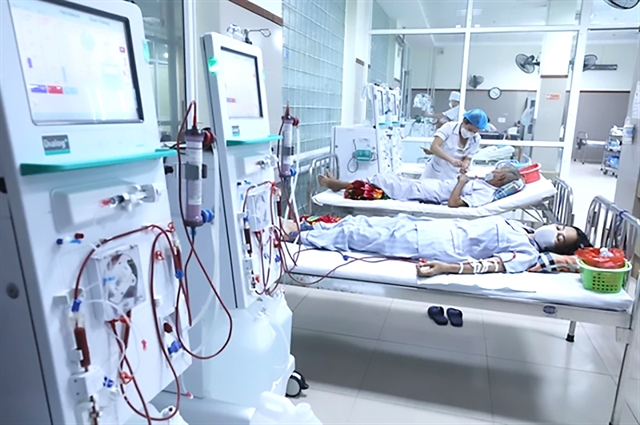 Society
Society

 |
| Patients undergo dialysis for diabetes complications. Việt Nam faces a public health crisis as diabetes cases triple since 2000, with over half undiagnosed. — VNA/VNS Photo |
HCM CITY — Việt Nam is facing a growing public health emergency as diabetes cases have tripled since 2000, with more than half of patients unaware they have the disease, health experts warned at a recent medical conference in HCM City.
An estimated 7 million Vietnamese are currently living with diabetes, but about 50 per cent remain undiagnosed, a dangerous gap that is fuelling serious, preventable complications and increasing the burden on the healthcare system.
Dr. Nguyễn Thị Bích Đào, president of the HCM City Diabetes and Endocrinology Association, said: “The real danger isn’t just the surge in numbers. It’s the fact that most people don’t know they’re sick until it’s too late."
The disease is particularly striking younger people at unprecedented rates.
New cases among adults aged 20-79 have tripled since 2000, and diagnoses are rising fast among those under 40, including children.
Doctors are now seeing patients as young as their teens.
More than 55 per cent of people with diabetes in Việt Nam suffer from serious complications, including heart disease (34 per cent), eye and nerve damage (39 per cent), and kidney failure (24 per cent), drastically increasing medical costs and reducing life expectancy.
Silent killer
Diabetes often develops silently, with vague or mild early symptoms. By the time clear signs such as excessive thirst, frequent urination, weight loss, or fatigue appear, many patients already face irreversible damage.
On average, complications begin to appear just three to five years after the disease takes hold.
Many cases only come to light when patients arrive at hospitals in critical condition — in diabetic comas or requiring limb amputation due to undetected long-term damage.
Experts have attributed the surge to poor dietary habits, rising obesity, and increasingly sedentary lifestyles. Fast food, sugary drinks like bubble tea, lack of physical activity, and the growing use of alcohol and tobacco among youth are all driving factors.
“The way young people eat, drink, and live today is fueling a silent epidemic of insulin resistance and metabolic disorders,” said Đào.
Nationwide screening needed
Health authorities are calling for immediate nationwide screening, particularly for those over 45 or with risk factors such as obesity, high blood pressure, or a family history of diabetes.
Early detection of prediabetes can reverse the course. But if we wait, it becomes a lifelong condition with deadly consequences, experts say.
The warning comes amid a lack of public awareness. Many Vietnamese, especially younger adults, skip health checkups, underestimate their risk, or fail to recognise the early signs of diabetes.
Doctors are urging the public to adopt healthier diets, avoid sugary drinks, increase physical activity, and get regular blood sugar tests before the disease becomes a life-threatening crisis.
“This is no longer a future problem,” Đào said. “It’s already here, and it’s costing lives.” — VNS




